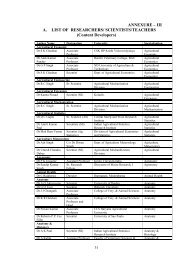Create successful ePaper yourself
Turn your PDF publications into a flip-book with our unique Google optimized e-Paper software.
) Shearing, skirtng and primary classing<br />
Shearing is one of the important operation at the sheep farm and considerable preparation<br />
is necessary before this event.<br />
1) Shear sheep at a separate shearing shed or room. The floor should be clean and free from<br />
dirt, dust or vegatable matters.<br />
2) Use of hand-shears may be avoided as it often results in double cuts thus reducing staple<br />
length.<br />
3) Utilize machine shearing service through the concerned state department. Machine<br />
shearing not only facilitates the quicker completion ofthe operation but also helps in<br />
getting uniform fleeces.<br />
4) Resort to shearing in the flocks twice a year viz., spring and autumn seasons.<br />
5) Shearing in the months of February and early July will help in reducing occurrence of<br />
canary colouration of wool.<br />
6) Graze sheep in the cooler hours and provide shelter during hot noon hours after shearing.<br />
7) Greasy fleece weight of individual sheep may be recorded after each shearing.<br />
8) Do skirting and primary classing of wool atthe shearing floor itself.<br />
9) Grade wool by visual appraisal, feel and handle.<br />
10) Graded wools fetch 10-20 percent more price.<br />
11) Sell wools to State Wool Marketing Department Wool Board.<br />
5. Health Management<br />
a) Ereatment-Prophylacsc and Curatlve<br />
<strong>Sheep</strong> enterprise can pay, provided suitable preventive measures have been taken against<br />
the occurrence of diseases. The agroclimatic conditions of the area play an important role in<br />
risk to many diseases. In semi arid regions of the country, the incidence of parasitism increases<br />
during rainy season. Therefore, it is necessary to drench sheep before the onset, during and at<br />
cessation of mon- soon. Dipping is done in the BHC/ DDT/Garathion/ Malathion/ Cimathion<br />
fortnight after shearing to get rid of ectoparasites. It should also be ensured to spray the sheds,<br />
simultaneously. The flock should be vaccinated against most common diseases like<br />
enterotoxaemia, sheep pox, haemorrhagic septicaemia and rinderpest depending upon the<br />
occurrence of the disease in the area. To aviod foot and mouth, foot rot and other feet diseases,<br />
antiseptic foot baths are given. The sick and diseased animals should be isolated from the flock<br />
and checked thoroughly for any contagious/diseases.<br />
For efficient disease control following recommendations are made:<br />
a) The Veterinarian /Farm Manager should provide a schedule of prophylactic health cover,<br />
viz. vaccination, drenching and dipping. In addition strategic drenching whenever<br />
necessary will be instructed. The Veterinarian /Farm Manager should further ensure<br />
procurement and supply of necessary medicines and vaccines to the unit for the purpose<br />
and maintain proper record of the procurement and use. The prophylactic health cover<br />
should be provided by the unit staff under the supervision of Health Staff and the Stock<br />
Assistants/ LaboratoyTechnicians with the Veterinarian / Farm Manager should assist the<br />
unit staff in this work. The Veterinarian/ Farm Manager should also issue written<br />
instructions for the dis-infection ofthe sheds and corrals whenever felt necessary and also<br />
at regular intervals. This should involve changing the earth in the sheds and corrals and<br />
replacing it by new earth mixed with lime and gammexene, painting of all structures with<br />
lime containing gammexene, and also spraying with gammexene or BHC in all area of the<br />
sheds and corrals and the surrounding areas.<br />
b) The treatment of sick animals should be done by the stock Assistant and Assistant Farm<br />
Manager except in such cases where specialised treatment is required which will be done<br />
by the Veterinarian . The instructions for treatment should be given in writing by the<br />
Veterinarian visiting the unit every morning. In case of serious illness the Stock<br />
Assistant/Farm Manager should inform the Veterinarian who should provide necessary<br />
treatment.<br />
444




